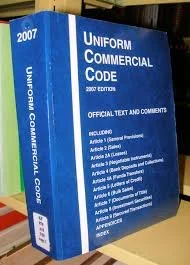The UCC
In Which I Start a More Regular Blogging Schedule By Using a Few of My Favorite Tropes
It took me from May to nearly the end of August to write. In aiming to re-establish a more regular posting schedule, I am going back to the well. Cover something you should know and be searching, Uniform Commercial Code filings, aka the “UCC.” I provide some background on this UCC thing, and I provide reasons to know UCCs. In talking and understanding UCCs, we can also understand why you should not search from a list.
Before we get there though, a little history…
At some point in the mid to late 1980’s, I started law school. That first year offered no electives. Instead, as budding jurists, we had to learn the canon: property, procedure, criminal law, the Constitution, torts, and of course, the raison d’etre for attorneys: contract law. With our contracts textbook also came a large paper tome, something I had never heard of before law school, even when I had taken “business law” as an undergraduate. Something called the Uniform Commercial Code. It seemed like 3/4th of contracts was learning how people could be stuck with their actions regardless of what was on paper, or if paper even existed. Occasionally, though we cracked that big book. Really, what I remember most about looking at the UCC was a variation of my favorite legal adage:
When you have the law on your side you pound the law. When you have the facts on your side you pound the facts. When you have neither the facts nor the law on your side, you pound the table.
See, we learned as first year law students that there were “general provisions” in the UCC. So, when you had no contract loophole to jump through, you could always plead from the general provisions of the code, which was legalese for pounding the table. What we did not do in law school was read any chapters in the UCC beyond chapter two: sales.
The UCC
This is not the first time I have blogged about UCCs or implored you to understand them. I do this because UCC filings show up, not in OSINT lists, but in the search menus of most online public record databases. Because UCCs are among the many records compiled in the Big Data some of you loathe. Because most open-source researchers did not take first year contracts or purchase an actual copy of the UCC. Because you can learn a lot from UCC filings—more than meets the eye. So, consider this a refresher on UCCs, and why we should not ignore doing UCC searches as part of our public record research.
Didn’t go back and read the links? Here it is, as stated in another book that I and my then law student compatriots used often, UCCs in a nutshell:
While UCC stands for Uniform Commercial Code. in the context of the searches we are talking about, UCC refers to one of the ten “Articles” in the Uniform Commercial Code, being Article 9, secured transactions. A secured transaction is one where a party (the “debtor”) puts up something, collateral, to get something. The most common form of secured transaction is the mortgage. In order to get a bank to loan you money, you agree that they can have the collateral if you do not make loan payments. But that’s not Article 9. It's important to know that transactions involving real estate are not covered in the UCC. Article 9 deals with secured transactions where the property, the collateral, the security, is not land, but what lawyers call personal property. A UCC filing is a public record to notate a security interest in personal property.
The structure created in Article 9 serves a few purposes, including articulating when a transaction becomes secured. More important, there’s a system of filing and notice. This provides a way for the secured party or “creditor,” to show its interest, and it provides a way for secured parties in general to claim priority in the event things go south—either if a bankruptcy happens or others seek to assert interest in the same collateral. It is this set of transactions, these UCCs filings. meant to “perfect” secured transactions and assert “priority,” that are searched on Lexis, etc.
Searches of UCC filings are done in the course of many deals. Lawyers want to know the extent of obligations in transaction due diligence. Banks want to ensure that no one else has a claim before lending. Us, we’re just nosy. It’s the classic example of something that’s in the public record, let’s make use of it. The UCC search played a key role in a recent engagement.
The Case of We Need to Identify Related Businesses
In a recent engagement, I worked with a team of internal auditors on a goal, identifying related businesses associated with certain executives and certain vendors. With publicly available records, we found companies where people were officers, managers, registered agents. And there was a restaurant in which one of the research subjects appeared to have a financial interest. Ultimately, for seven research subjects, there were more than 50 related businesses. The beauty, the magic of public record research, yes—OSINT, is that so much information is public, out there, “open-source,” and when accessed and analyzed it can lead to invaluable intelligence.
The restaurant interest I found did not come from a typical OSINT company information source, which underscores why I advocate going beyond the OSINT ‘list only’ approach to research, which is the idea that you can follow a menu of OSINT websites to get to the information you need (here’s probably the most known OSINT list). The OSINT approach silos data by category. If you want company information, you go to company websites. If you want phone number information you go to phone number websites. A better approach is to gather public records and then see what kind of information may be contained. You never know what you may find until you gather and review.
A record that is public can be used any way you want. As my friend Steve Mason recently wrote on his LinkedIn, you can use old newspapers to trace a telephone number. In my recent engagement, the little nugget of an undisclosed business affiliation came from a UCC filing. You will not usually find UCC filings in OSINT lists under Company Searches. So, it may be a mistake to limit yourself only to what’s on the list.
Why Search UCC Filings
In doing background research, for whatever reason, search UCC filings. Here are two important things to look for:
What it was intended for
What it also does
What it was intended for
You can get from UCC searches exactly what they intend to provide—notice of secured transactions. In other words, if you are researching a debtor, you will find evidence of its liabilities. If you are researching a creditor, you will find evidence of its assets, or to restate this, when you find that your subject is a debtor, you’ve found liabilities of theirs and when you find that your subject is a secured party, you’ve found some of their assets. These things can often prove vital in your overall searches.
What it also does
The reason we search UCC filings is more often, for what it also does. Say you are looking for assets. When you find a UCC filing, you are finding a person’s liability, right? We just said that. Except the whole point of the UCC is that you have some property, there is some property in the first place that is then used as security or collateral—an asset. Let’s digress and say this, UCC laws do not require much specificity in naming assets. They UCC can tell you that assets exist, but often will not tell you what the asset is. It does give leads that can be followed up in interviews or in reviewing other documents. UCC filings are a key part of asset searches. Remember this too, the UCC record you find when searching usually exists long after the transaction ended or the UCC was terminated. The property noted in the UCC filing may still exist. Thus, do not ignore older filings produced in your online searches.
UCC filings can be a key part in identifying hidden business affiliations. A person may not be an officer/manager/member in a company in a way that would show up on searches of Secretary of State records, or they could be a manager of a Delaware limited liability company that cannot be searched, but they can be a co-debtor in a UCC filing. The bank or such does not care for corporate technicalities, if they know you are connected, they want you on the UCC, on the hook. Finding those co-debtor relationships finds affiliations you would not have known if you only searched company databases.
Another way you can find hidden affiliations via UCC searches is that online UCC records include addresses for the parties. You can search these databases by address, not just by subject name. You can find businesses at the same address and may presume they are related regardless of who the officers/members/managers are.
Finally, you can find suspect situations through UCC filings. As mentioned above, a UCC gave a party priority in the event of bankruptcy. We occasionally see sham transactions when a related party files a UCC so they can assert priority when people are fighting over an estate. Or it can be when a party is siphoning money in the form of dummy loans. Whenever a debtor and creditor in a UCC filing seem to be related in any way, be wary. You can find nefarious dealings with UCC searches.
You do not need to understand all that Article 9 stuff about pledges, perfections, priorities, nor do you need to know why we call UCC filings, UCC filings. What you should know is that these are public records, and they can be invaluable in your research. Finding vital information does not only come from following the OSINT lists. It also comes from taking advantage of what else is out there and knowing what it means.

